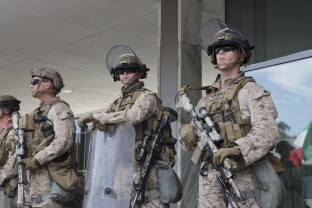President Donald Trump’s deployment of soldiers to police American streets suffered an expected legal setback on Tuesday, with a federal judge saying that the recent use of the California National Guard to quell protests in Los Angeles clearly violated the law.
U.S. District Judge Charles Breyer concluded that Trump administration officials knew they were breaking the law as they did it, writing that they “violated the Posse Comitatus Act willfully,” referring to the law that limits the military’s involvement in domestic law enforcement.
The judge also pointed to evidence presented in court that military personnel had sketched out hard rules to abide by the laws, but still “contradicted their own training materials, which listed twelve functions that the Posse Comitatus Act bars the military from performing.”
“These actions demonstrate that defendants knew that they were ordering troops to execute domestic law beyond their usual authority,” Breyer wrote.
Breyer’s decision comes weeks into Trump’s subsequent deployment of even more soldiers in Washington, D.C., starting what is expected to be a journey to the Supreme Court — and yet another clash with courts trying to limit the president’s broad exercise of executive power.
The judge forbade the federal government from domestic use of the military as law enforcement, ordering the Trump administration to halt from “deploying, ordering, instructing, training, or using the National Guard … to execute the laws.” But he paused his own order for 10 days, saying it would kick in starting Friday, Sept. 12, at noon.
Asked for comment, White House spokeswoman Anna Kelly said Trump “saved Los Angeles” and indicated the administration will fight the ruling.
“Once again, a rogue judge is trying to usurp the authority of the Commander-in-Chief to protect American cities from violence and destruction,” she said in an email Tuesday afternoon.
California sued the Trump administration in early June, just after the White House yanked away control of the state’s National Guard from Gov. Gavin Newsom. The Defense Department placed 4,000 of the state’s federalized troops and 700 Marines under the control of a group called Task Force 51, which proceeded to accompany Immigration and Customs Enforcement and the FBI on law enforcement missions.
Breyer’s 52-page opinion largely restates the broad concerns he expressed during a three-day trial, which revealed the way troops coordinated with the FBI on a manhunt and left the judge wondering whether the government recognized any legal limits to use of the military on U.S. soil. Breyer also voiced a deep worry that the Trump administration was beginning to develop a “national police force” unlike the country has ever seen.
Breyer wrote that the Trump administration “systematically used armed soldiers” to “set up protective perimeters and traffic blockades, engage in crowd control, and otherwise demonstrate a military presence in and around Los Angeles.” The soldiers carried loaded rifles and drove in armored vehicles as they formed perimeters and accompanied ICE agents while they performed deportation raids.
Trump has already threatened to wrestle away control of state troops from Democratic governors and send in troops under his command to blue cities across the nation, with an eye toward Chicago, New York City and Oakland, California.
Breyer addressed that directly, noting that “President Trump’s recent executive orders and public statements regarding the National Guard raise serious concerns as to whether he intends to order troops to violate the Posse Comitatus Act elsewhere in California.”
Although this judge’s decision does not create legal precedent that other jurisdictions must abide by, it does give cities legal ammunition to counter any deployments. And any disagreement between appellate circuit courts could fast-track a trip to the nation’s high court for a decisive decision.
Just as Breyer’s opinion was released, Trump took to social media to vow that he would turn his attention to Chicago and “solve the crime problem fast, just like I did in DC.”
This story has been updated with a comment from the White House.
Sign in
Log into your free account with your email. Don’t have one?
Check your email for a one-time code.
We sent a 4-digit code to . Enter the pin to confirm your account.
New code will be available in 1:00
Let’s try this again.
We encountered an error with the passcode sent to . Please reenter your email.


